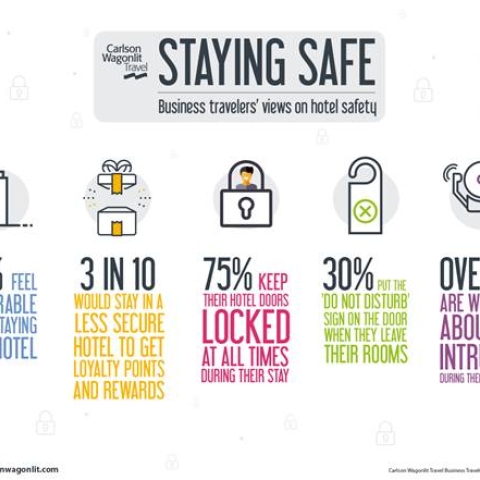Carlson Wagonlit Safety and Security Study Shows the Value of Loyalty Programs

Carlson Wagonlit released its latest CWT Safety & Security Study on May 31 – and the results might surprise you. Based on survey results, the lure of hotel rewards and incentives trumps safety concerns for three out of ten business travelers globally.
To participate in the study, travelers were required to have made more than four business trips within the past 12 months, increasing the likelihood of their having preferred hotels or hotel chains. Forty-seven percent of the more than 2,000 travelers surveyed said they would choose hotel points over personal safety.
Only 35 percent of business travelers from the United States expressed concerns about safety in hotels, followed by 25 percent of Canadian travelers and 23 percent of travelers from Mexico.
While hotel safety doesn’t appear to be a high priority globally, or even within this region, more than half (53 percent) of business travelers from the United States say the physical location of their hotel alone has made them feel unsafe while traveling for business.
The reason for this feeling of unease may be based on the type of property in question. An analysis of hotel bookings made by CWT clients in 2017 showed that only 52 percent of Americas travelers stayed at 4- and 5-star properties, while 45.2 percent stayed in 1- and 2-star properties.
The biggest concerns expressed by survey participants were around hotel room break-ins, followed closely by unauthorized room access as a result of hotel employee error.
For event organizers, the safety and security of attendees should always be the top priority. However, it is also important to have realistic expectations when reserving hotel room blocks. Regardless of how nice your host hotel may be, there will always be some guests who choose to stay at a brand that commands their loyalty. Providing tips on safety and security best practices to all your event attendees is a good way to help keep them safer.
Best practices for hotel safety and security include locking your door at all times, including using the deadbolt.
“While most hotel rooms lock automatically, a number of solutions available on the market can provide an added layer of security,” said David Falter, president of RoomIt by CWT, a division of Carlson Wagonlit Travel.
He also recommended the use of items such as door wedges, portable door locks and travel door alarms to help travelers more effectively secure their rooms.
Safety-conscious guests are also likely to put the ''Do not Disturb'' sign on the door when they leave the room – 30 percent of travelers globally and 38 percent from the U.S. frequently adopt this cautionary method when traveling.
Another best practice is to take room keycards out of their folder – 37 percent of travelers globally do this to make sure the key can’t be linked to their room in the event of it being lost or stolen.
U.S.-based travelers also believe that their room floor can have an impact on safety. Twenty-nine percent said they opt for a higher floor when possible, while 21 percent choose a lower floor. Nearly a third of travelers (32 percent) reported that they avoid staying on the ground floor.
Falter provided a tip for travelers: “Security experts typically advise staying between the third and sixth floors, where it becomes difficult for an intruder to break in, but you’re still within reach of most fire departments’ ladders.”


Add new comment